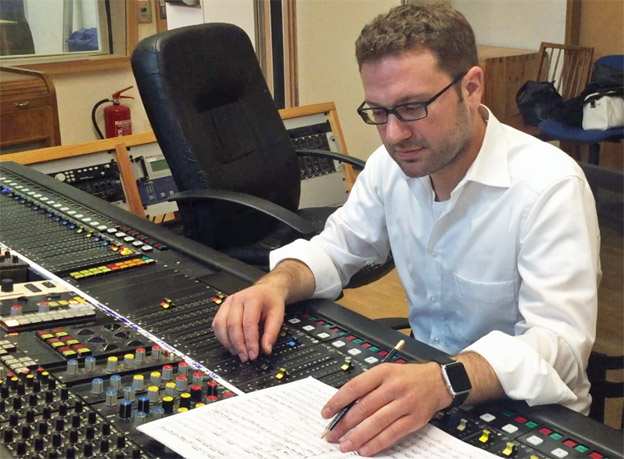Marco Battistella is an International Classical Music Awards nominated Producer and a voting member of the Recording Academy. He is the producer of a brand new production with Johann Sebastian Bach’s Goldberg-Variations on Hänssler Classic.
Marco Battistella’s company focuses on authentic classical music recordings and is located in Vienna/Austria. It is one of the upcoming classical music production companies in German- speaking countries, and the team has a vast experience in producing quality work for the most demanding listener.
We met Marco in his recording studio and asked him to reveal some of his secrets.
Marco Battistella, you just produced the Goldberg Variations with pianist Jean Muller. What can the listener expect?
This production has been done with a single stereo set of microphones, allowing a natural depth and width. It leaves the listener with the essence of the sound and provides authentic musical and sonic details. Jean Muller is a rising pianist of our time and the album brings a well-known work of the great composer to new life. I am also very happy to announce that until November three further albums will officially be released. One piano CD by a Belarusian/Luxemburgish pianist and two orchestral works with internationally renowned musicians and orchestras.
You have worked with a great number of musicians, soloists, choirs and orchestras. What fascinates you about producing music?
I decided to get into music production because I felt that, at least for classical music productions, the sound wasn’t always like I wanted it to be. It far too often happens that you have a musically very beautiful and rewarding performance, but it doesn’t hit on you because of a weak sound recording. That’s why I tried a different approach.
So what is really attractive for you?
That’s the million dollar question. It begins with the work you do together with the musician before even starting to record. During the rehearsal it’s important to get the right balance between the instruments. My philosophy is that about 90 percent of the end result is fixed before and during the recording and not afterwards in the post-production. In the mix you should clean up and not start doing the sound. That is not our job, at least not in classical music.
How do you work with the musicians?
It is a job, but it is also a big passion – sometimes there is a lot of emotion involved and you start working really intimately. A musician told me once: “You know Marco, recording is more intimate than sex.” And I said: “Yes, that is true.” Because you get on a really blunt level, it is like having a mirror in front of you. Once you get into that feeling you can really start to create something.
Are you more interested in live recordings with an audience or in studio recordings?
Realistically a recording is done with an audience, because if you have audience you have a different setting as a musician. You have a different tension and you try to be as good as possible. That’s why I started inviting audience to recording facilities. I invite between 15 and 100 people for the last two recording days and I make the musicians perform in front of them. You wouldn’t believe what a difference it makes.
How do I recognize Marco Battistella recordings?
My recordings are conceived in a way that the first time you listen to them, you might feel that there is nothing spectacular. We create a very authentic and natural sound. But the more you listen, the more you will hear details, musically and sonically. In my opinion music should be consumed actively and you should really listen to it, get into the depth of the sound of the music. I once had a customer who wrote me a very nice email. She said: “I listen to this recording six times in a row and it gets better and better.” And that’s what I appreciate.
Your work has been honored with multiple awards. If you look back what was the highlight of your career, so far?
I don’t know if there is ‘the’ highlight. To me highlights are not necessarily awards. Highlights for me are, for example, a new orchestra that calls me up and says we heard this recording and we want you to do our next recording. That’s the biggest compliment. Awards are very nice, because they tell you that somebody listened to your project and appreciates it. That is very beautiful and I hope to get some more, but for me the highlight is working with all different kinds of people.
The music market changed drastically during the last decades, do you realize that in your work as a producer?
The number of my projects increase. I have never been booked as much as I am now. But I see a change in the way people want their recordings to be done. The most important is that it has to be fast, fast, fast. Do the recording in three days, and one and half a months later we need a release. I am not sharing such a trend, because in my opinion, after the recording is done, you need time to sink into the music and get to the post-production. My productions take four to five months from the recording to the release.
Part of the specific sound you create is due to the recording equipment you use.
It all starts with your microphones. So I have my own set of microphones and I will never travel without them. Microphones are like musical instruments, they change sonically. I know exactly which microphone to choose for which situation. Everything that comes after the choice of the microphone is a philosophical question. In this studio here we have a lot of vintage equipment from the 1970s starting with a very old Newman mixing console or this Telefunken tape recorders which gives this unique vintage sound. I like my sound being natural and I like it breathing without coloring it too much. That is why you need very high standard converters.
In which classical music domains are you most booked in?
It started with a lot of chamber music, soloists, duos, trios and so on. Currently I work with a lot of orchestras. They often book me for concert recordings where we record the dress rehearsal and maybe one or two other rehearsals. Nowadays, the trend for big orchestras is to release their concert recordings on CD because the quality has improved so much. So that is a big trend at the moment.
What are your goals?
My secret passion is very old music. I rarely record old music and I certainly regret it. I do a lot in romantic music which is great, but I would like to expand my horizon a little more. I would also like to expand on the market. The US classical market is bigger than one would think. European musicians are not as known in the US and vice versa as it could be. I think that it is also the job of the producer and the label to really promote music on other continents.
If I come to your house and look at the CDs and albums you are currently listening to, what would I find and what is in your CD player right now?
Well, currently you will find two big piles. One pile is the Grammy submissions which I am currently listening to and the other pile is the recordings that I released this season. There are about ten of them which I have to listen to again to evaluate for myself, if we are going into the right direction.
So this has to do with your work. Is there any other music you are listening to, privately?
It might come as a bit of a shock, but if I come home, I prefer to not listen to anything. I don’t even want the TV on. If I listen to something, I have a secret passion for metal and rock. For me this music is an outlet to relax.
To learn more about Marco Battistella and for contact info please visit his site: www.produzent.tv























